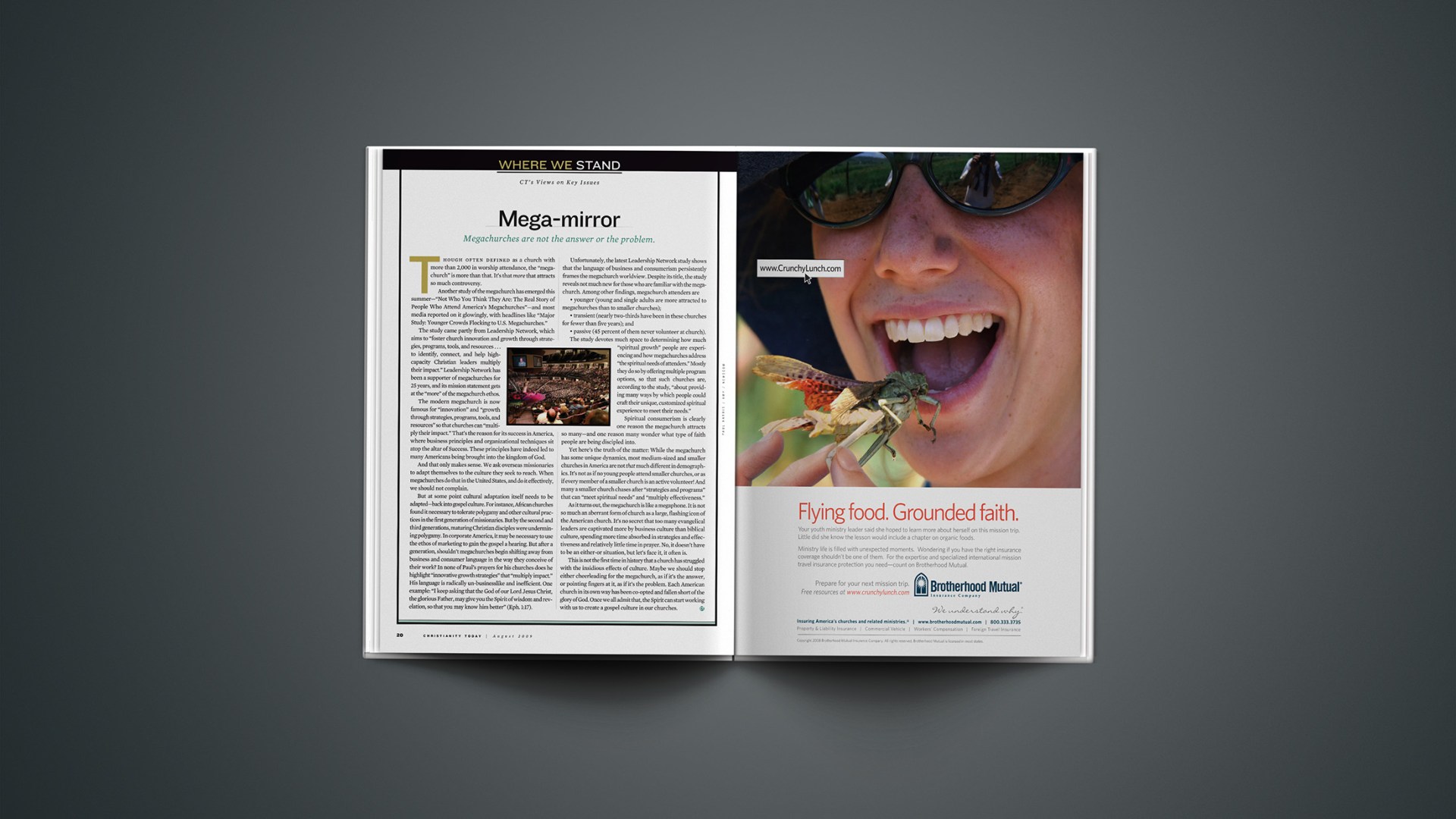Though often defined as a church with more than 2,000 in worship attendance, the “megachurch” is more than that. It’s that more that attracts so much controversy.
Another study of the megachurch has emerged this summer—”Not Who You Think They Are: The Real Story of People Who Attend America’s Megachurches”—and most media reported on it glowingly, with headlines like “Major Study: Younger Crowds Flocking to U.S. Megachurches”
The study came partly from Leadership Network, which aims to “foster church innovation and growth through strategies, programs, tools, and resources … to identify, connect, and help high-capacity Christian leaders multiply their impact.” Leadership Network has been a supporter of megachurches for 25 years, and its mission statement gets at the “more” of the megachurch ethos.
The modern megachurch is now famous for “innovation” and “growth through strategies, programs, tools, and resources” so that churches can “multiply their impact.” That’s the reason for its success in America, where business principles and organizational techniques sit atop the altar of Success. These principles have indeed led to many Americans being brought into the kingdom of God.
And that only makes sense. We ask overseas missionaries to adapt themselves to the culture they seek to reach. When megachurches do that in the United States, and do it effectively, we should not complain.
But at some point cultural adaptation itself needs to be adapted—back into gospel culture. For instance, African churches found it necessary to tolerate polygamy and other cultural practices in the first generation of missionaries. But by the second and third generations, maturing Christian disciples were undermining polygamy. In corporate America, it may be necessary to use the ethos of marketing to gain the gospel a hearing. But after a generation, shouldn’t megachurches begin shifting away from business and consumer language in the way they conceive of their work? In none of Paul’s prayers for his churches does he highlight “innovative growth strategies” that “multiply impact.” His language is radically un-businesslike and inefficient. One example: “I keep asking that the God of our Lord Jesus Christ, the glorious Father, may give you the Spirit of wisdom and revelation, so that you may know him better” (Eph. 1:17).
Unfortunately, the latest Leadership Network study shows that the language of business and consumerism persistently frames the megachurch worldview. Despite its title, the study reveals not much new for those who are familiar with the megachurch. Among other findings, megachurch attenders are
- younger (young and single adults are more attracted to megachurches than to smaller churches);
- transient (nearly two-thirds have been in these churches for fewer than five years); and
- passive (45 percent of them never volunteer at church).The study devotes much space to determining how much “spiritual growth” people are experiencing and how megachurches address “the spiritual needs of attenders.” Mostly they do so by offering multiple program options, so that such churches are, according to the study, “about providing many ways by which people could craft their unique, customized spiritual experience to meet their needs.”
Spiritual consumerism is clearly one reason the megachurch attracts so many—and one reason many wonder what type of faith people are being discipled into.
Yet here’s the truth of the matter: While the megachurch has some unique dynamics, most medium-sized and smaller churches in America are not that much different in demographics. It’s not as if no young people attend smaller churches, or as if every member of a smaller church is an active volunteer! And many a smaller church chases after “strategies and programs” that can “meet spiritual needs” and “multiply effectiveness.”
As it turns out, the megachurch is like a megaphone. It is not so much an aberrant form of church as a large, flashing icon of the American church. It’s no secret that too many evangelical leaders are captivated more by business culture than biblical culture, spending more time absorbed in strategies and effectiveness and relatively little time in prayer. No, it doesn’t have to be an either-or situation, but let’s face it, it often is.
This is not the first time in history that a church has struggled with the insidious effects of culture. Maybe we should stop either cheerleading for the megachurch, as if it’s the answer, or pointing fingers at it, as if it’s the problem. Each American church in its own way has been co-opted and fallen short of the glory of God. Once we all admit that, the Spirit can start working with us to create a gospel culture in our churches.
Copyright © 2009 Christianity Today. Click for reprint information.
Related Elsewhere:
Previous Christianity Today articles about megachurches include:
The Other Side of Church Growth | Philip Jenkins says we need a theology of church extinction. (March 18, 2009)
Willow Creek’s ‘Huge Shift’ | Influential megachurch moves away from seeker-sensitive services. (May 15, 2008)
What Reveal Reveals | Criticisms of Willow’s latest self-study do not undermine its value. (February 27, 2008)
Am I Growing Yet? | What a disappointed “fully devoted follower of Jesus” should be looking for. (October 25, 2007)
High-Tech Circuit Riders | Satellite churches are discovering a new way to grow the body of Christ. (October 31, 2005)
More editorials are available on our site.










